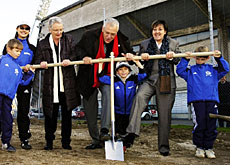Environmental appeals mainly successful

Switzerland's environmental organisations have said latest statistics show they are justified in appealing against new building projects.
Green groups are facing increasing pressure from the political right and the business community, who say they are blocking economic growth.
In a statement on Friday, 16 environmental organisations said that last year nearly 80 per cent of projects they opposed had been modified, following appeals to the authorities or the courts.
In four out of five cases handled by the Federal Court in 2005, the judges ruled in favour of the associations. Cases included saving the interior decoration of an old shop in Basel or the modification of a motorbike trail to bypass a nature reserve.
The associations claim around 60 per cent of complaints they brought were settled quickly at a local level in 2005, and 84 per cent of all procedures stayed out of the courts.
A Geneva University study in 2004 showed that green groups’ appeals to the country’s highest tribunal between 1996 and 2003 were successful in over 60 per cent of cases.
Despite this, no fewer than 25 proposals to limit these organisations’ legal clout have been tabled in parliament since 2002. Legislation, some dating back as far as 40 years, allows environmental associations to block building projects or demand changes to plans.
Football
The issue became headline news in 2004, when environmental groups appealed against a new football stadium in Zurich.
The stadium was seen as a key element for the 2008 European Football Championships, to be hosted jointly by Switzerland and neighbouring Austria.
The Transport and Environment Association in particular was accused of trying to wreck preparations for Euro 2008.
The latest proposal aims to simplify procedures and limit the number of organisations that can appeal. It also calls for a ban on out-of-court settlements and would hand the cost of proceedings to the association that appeals.
Environmental organisations have been challenging this proposal, claiming it would not simplify procedures. They are also concerned that if they have to bear court costs, it would severely limit their ability to appeal against projects.
The associations say the debate in parliament is absurd and that politicians are not addressing the real issues. They say they use the right to appeal discriminately and sparingly.
The centre-right Radical Party doesn’t agree. It has been collecting signatures to force a nationwide vote to prevent appeals against all projects approved by voters or a parliamentary assembly.
In 2003, a survey carried out by Bern’s gfs polling institute showed that 80 per cent of the population considered that the right to appeal was vital to protect the environment.
swissinfo with agencies
In 2005, environmental organisations lodged 244 appeals aimed at protecting the landscape or national heritage. Around 80% of these were upheld.
84% of these cases were resolved without going to court.
Since 2002 there have been 25 attempts in parliament to block appeals by green groups.

In compliance with the JTI standards
More: SWI swissinfo.ch certified by the Journalism Trust Initiative


You can find an overview of ongoing debates with our journalists here. Please join us!
If you want to start a conversation about a topic raised in this article or want to report factual errors, email us at english@swissinfo.ch.